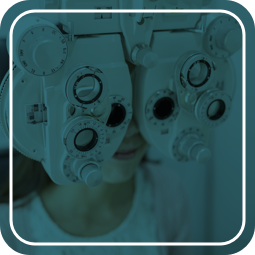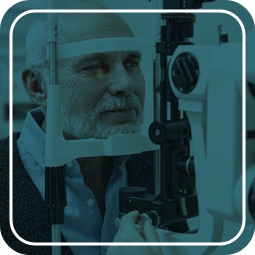If you’re having a hard time reading at a normal distance or focusing on nearby objects, it could be a sign that you’re suffering from a refractive error known as presbyopia. Luckily, a basic eye exam can help your optometrist detect presbyopia and get you the treatment you need in order to see clearly.
If you have presbyopia, it means your eyes are slowly losing the ability to focus on nearby objects, which is a natural part of the aging process. Luckily, there’s multiple treatment options available to you depending on your needs and personal preferences. Book an appointment with your eye doctor to discuss whether eyeglasses, contact lenses, or laser eye surgery is right for you.
When it comes to presbyopia, a common question we get asked is whether or not LASIK is a suitable treatment option. Keep reading to learn more about presbyopia, how it’s treated, and how LASIK could benefit you.
What is Presbyopia?
Presbyopia is a type of refractive error that affects your ability to see nearby objects clearly. This condition is age-related and typically begins to affect people in their 40s.
Presbyopia occurs when the lens in your eye loses elasticity. Your lens is responsible for focusing light onto the retina in order to see nearby objects. As you age, the lens can become more rigid, losing its ability to quickly reshape and making it harder to focus.
What Are the Signs & Symptoms of Presbyopia?
Presbyopia usually develops gradually so you may not notice your symptoms right away. Most people begin to notice the following symptoms at around age 40:
- A tendency to hold reading material farther away to make the letters clearer
- Blurred vision at normal reading distance
- Eyestrain or headaches after reading or doing close-up work
- You may notice these symptoms are worse if you are tired or are in an area with dim lighting
If you have any of the above symptoms, it’s best to book an appointment to see your eye doctor as soon as possible. It’s especially important to see your doctor if:
- You’ve suddenly lost vision in one eye
- You have sudden hazy or blurred vision
- Your see flashes of light, black spots or halos around lights
- You save double vision
Am I at Risk?
You’re at a higher risk of developing presbyopia prematurely if you have:
- Anemia
- An unhealthy diet
- Cardiovascular disease
- Diabetes
- Another refractive error like myopia or hyperopia
- Multiple sclerosis
- Eye trauma or disease
- Poor blood flow
How is Presbyopia Treated?
Although there is no cure for presbyopia, there are treatments available to improve your vision. If you have presbyopia, your eye doctor may recommend any of the following:
- Eyeglasses
- Contact lenses
- Laser eye surgery
To find out which treatment is best for you, book an eye exam with your eye doctor today!
LASIK Eye Surgery & Presbyopia
LASIK, or laser-assisted in situ keratomileusis, is a popular eye surgery that can correct a number of refractive errors, like myopia or hyperopia. However, it’s not always recommended for presbyopia.
In most cases your eye doctor will recommend trying eyeglasses or contact lenses to treat your presbyopia first but there is a specific technique using LASIK, called monovision, that can be used to treat presbyopia.
In a monovision procedure, one eye is corrected for distance and the other is corrected for near vision, expanding your range of vision. Most LASIK Eye Surgeons will also offer Refractive Lens Exchange (RLE) to enhance the LASIK procedure or as an alternative option. RLE offers a variety of intraocular lenses, which include multi focal, toric and accommodative options. For more details, your optometrist can provide a general review and arrange for a consultation with one of our local surgeons for further consideration.
Is LASIK Right For Me?
If you don’t want to or can’t wear corrective eyewear, the monovision LASIK procedure or RLE could be right for you.
Whether or not LASIK is right for you depends on your individual vision needs. During an eye exam, your eye doctor will take an in-depth look at your eye health to determine if you’re a suitable candidate.
The success of the procedures will ultimately depend on the brain’s ability to adapt, so one option may not be right for every patient.
Book Your Consultation Today
Laser eye surgery can help you see clearly while lowering your dependence on glasses or contacts. At Downtown Eye Care & The Contact Lens Department, we are knowledgeable in the latest laser eye surgery procedures to serve you better. Book your consultation to learn more about the benefits associated with laser eye surgery and how the procedure can help you. Have questions? Our team is always here to help. Contact us today!















